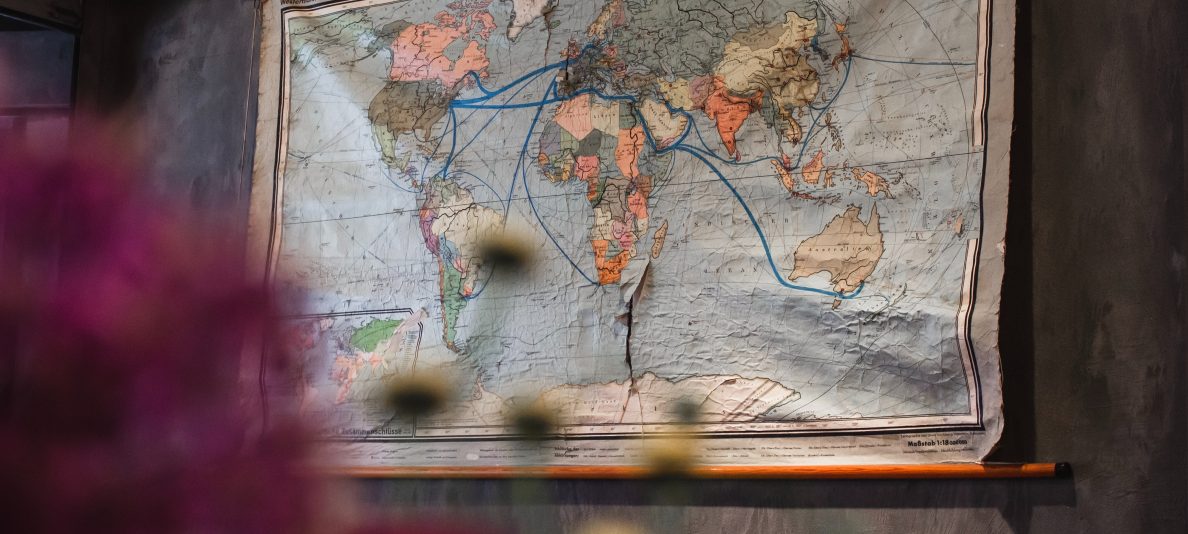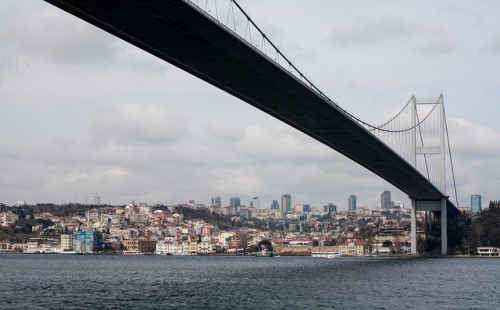At one end of Istanbul’s Bosphorus Bridge, says Elif Shafak, is a sign that says “Welcome to Europe.” At the other end, another sign reads, “Welcome to Asia.” Shafak, the most widely read female author in Turkey, knows well this city that spans the Bosphorus Strait and connects two continents. She also knows well the push and pull of Eastern and Western cultures in Istanbul. She writes in Time Asia:
East and West are not water and oil. They do mix. And in a city like Istanbul they mix intensely, incessantly, surprisingly. That can leave the city confused about its identity. We Turks like to brag about straddling past and present, East and West, but we are not quite sure what we mean by that. We think of these two civilizations as boroughs we can go in and out of randomly. . . . But things are not so simple.”
Expanded Circles: Elif Shafak
Shafak has lived out her own cross-cultural experience. Born in France to Turkish parents, she was later raised by her mother in Turkey. Then, after her mother became a diplomat, they moved to Spain, Jordan, Germany, and back to Turkey.
“Everywhere I went,” she says in a TED Talk, “The Politics of Fiction,” “I felt like my imagination was the only suitcase I could take with me. Stories gave me a sense of center, continuity, and coherence, the three big Cs that I otherwise lacked.”
While living in Madrid, Shafak attended an international school where she was the only Turk. While she describes the school as “a miniature United Nations,” it was not “a cosmopolitan, egalitarian classroom democracy.” Rather, she first encountered cultural stereotypes there. In her later moves with her mother, she saw more and more the general human penchant for retreating into “cultural ghettos”:
Now we all live in some kind of a social and cultural circle. We all do. We’re born into a certain family, nation, class. But if we have no connection whatsoever with the worlds beyond the one we take for granted, then we too run the risk of drying up inside. Our imagination might shrink; our hearts might dwindle, and our humanness might wither if we stay for too long inside our cultural cocoons. Our friends, neighbors, colleagues, family—if all the people in our inner circle resemble us, it means we are surrounded with our mirror image.
Shafak’s tool for helping break us all out of our cocoons is her fiction. She is the author of a number of novels, including The Forty Rules of Love: A Novel of Rumi, which bridges 13th-century Persia and present-day Boston, and Honor, which tells the stories of Kurdish twins, one who grows up to live in London, the other staying in a small village in Turkey.
“I’m not saying that fiction has the magnitude of an earthquake,” says Shafak, “but when we are reading a good novel, we leave our small, cozy apartments behind, go out into the night alone and start getting to know people we had never met before and perhaps had even been biased against.”
Intersecting Journeys: O. Z. Livaneli
I have not read any of Shafak’s novels, but I did recently finish Bliss: A Novel, written by O. Z. Livaneli in 2006. (It was made into a film in 2007.) Livaneli, like Shafak, is one of Turkey’s most prominent and most-read authors. And, like Shafak, his works often investigate the meeting of cultures.
In Bliss, the cultures are embodied by three characters: Meryem is a fifteen-year-old from a small Turkish village. After being raped by her outwardly pious uncle, she is shunned by her community. Then she is taken to Istanbul by her cousin to be killed. Cemal, a soldier, newly returned from fighting rebels in the mountains, is the cousin chosen to carry out the “honor killing.” And Irfan is a Western-educated professor who abruptly leaves his wife—and his wealthy lifestyle—to sail the Aegean Sea. It is on his journey that he meets Meryem and Cemal.
At first the novel tells three seemingly unrelated stories, each from a distinct viewpoint. Then, as the characters come together, their stories, and their perspectives, intertwine. The settings are varied as well: the shack where Meryem is imprisoned, given only meager food and a rope for hanging herself; the dangerous mountains where Cemal kills ruthlessly so that he won’t be killed; and the university offices populated by the colleagues whom Irfan despises. And then there are the locations that bring them together and expose them to people of still other backgrounds: the train compartment on the way to Istanbul, the chaotic city center and its decrepit surroundings, the home of an eccentric retired ambassador, and the close quarters of Irfan’s rented sailboat.
Through it all, the three have their worlds expanded, in dramatic and often very painful ways.
The Gift of Bridges
Thankfully there are storytellers around the globe such as Shafak and Livaneli, authors whose works juxtapose cultural differences and uncover similarities. These writers allow us to pick up their books and step outside the mirrored walls of our houses and onto bridges that traverse oceans and connect cultures.
By walking these bridges, we reach distant shores, and when our feet touch foreign ground, we find signs that read, “Welcome,” even when it’s not so simple.
(Elif Shafak, “Pulled by Two Tides,” Hurriyet Daily News, August 13, 2006, first published in Time Asia, August 7-14, 2006)
[photo: “Bosphorus Bridge,” by Simon Q, used under a Creative Commons license]

